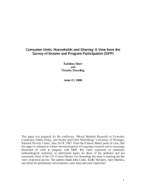Consumer Units, Households and Sharing: A View from the Survey of Income and Program Participation (SIPP)
Consumer Units, Households and Sharing: A View from the Survey of Income and Program Participation (SIPP)
Abstract
Poverty measures are based on assumptions about resource sharing for families and unrelated individuals, and on the premise that people who are related to one another and share the same living quarters pool their resources for the purpose of meeting important needs. These assumptions can have large and differential effects on poverty measurement. Recent data from the 2001 Survey of Income and Program Participation SIPP panel on sharing of expenses, and qualitative data are then employed to piece together a story about economies of scale and shared expenses in order to arrive at a better measure of resource sharing within and across consumer units, families and households. The effects of using different “unit” definitions on poverty rates and composition are illustrated using data from SIPP. If we are to improve our understanding of family and household economic functioning in surveys such as the (SIPP), we will need to find better qualitative measures of family economic functioning to complement and defend our empirical strategies.
Others in Series
Working Paper
Working Paper
Working Paper




